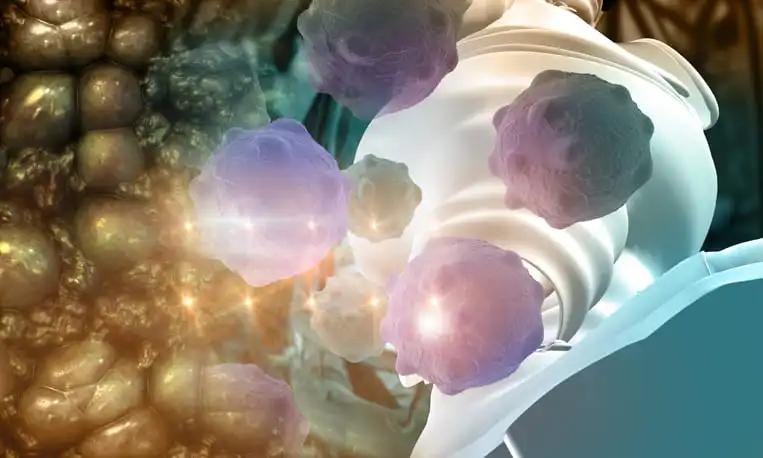KEY TAKEAWAYS
- The phase II trial aimed to assess the safety and effectiveness of carfilzomib, pomalidomide, and dexamethasone in maintaining high-risk MM.
- The result demonstrated that KPd is safe and effective maintenance in high-risk myeloma, warranting further research on optimized strategies.
High-risk patients experience a survival advantage through combined maintenance strategies involving proteasome inhibitors (PI) and immunomodulatory drugs (IMiD). For a study, researchers aimed to assess the safety and effectiveness of carfilzomib, pomalidomide, and dexamethasone in maintaining high-risk multiple myeloma(MM).
Newly diagnosed high-risk myeloma patients achieving ≥partial response post-autologous stem cell transplantation (ASCT) were enrolled. High-risk myeloma was defined by the presence of t(4;14) in 31%, t(14;16) in 17.2%, del17p in 58.6% of patients via fluorescence in situ hybridization (FISH) or cytogenetics (CTG), or the presence of ≥20% circulating plasma cells (pPCL) in 6.9%.
The double-hit myeloma (as defined by presence of ≥2 high-risk cytogenetic abnormalities, including gain of 1q) was observed in 58.6% of patients. Treatment cycles spanned 28 days, with intravenous administration of carfilzomib (20/56 mg/m2) on 1, 8, and 15 days and oral administration of pomalidomide (2 mg) on days 1 to 21. Dexamethasone (40 mg) was administered orally on days of carfilzomib administration—statistical analysis employed SAS Version 9.4.
Following the safety run with the initial 3 patients, 26 were enrolled, with a median age of 60 years (range, 46−75); 58.6% male and 58.6% black. At diagnosis, 65.5% had RISS stage 3 disease. Double-hit disease was present in 54.5% of whites and 64.7% of blacks. The median time from diagnosis and transplant to study entry was 9.3 months (range, 6.08-12.42) and 2.89 months (range, 2-8.51), respectively. The ≥CR and ≥VGPR rates were 24.1% and 68.9%, respectively, deepening to 89.7% and 100% during the study. The median time to best response was 1.84 months (range, 0-13.34).
Among 15 patients with available MRD data, MRD (10-5) and (10-6) were achieved in 86.7% and 66.7%, respectively. With a median follow-up of 30.5 months, 48-month PFS was 54%, and 48-month OS was 67%. Notably, all patients who progressed or died had double-hit disease, except one. RISS observed no PFS or OS difference. About 27.6% of patients were still receiving treatment; progressive disease was the most common reason for permanent treatment discontinuation (34.5%). Among the 6 patient deaths, progressive disease was the leading cause (83.3%).
The predominant hematological treatment-emergent adverse events (TEAEs) in the cohort were neutropenia [55.2% (Grade 3/4: 55.2%)], anemia [13.8% (Grade 3/4: 0%)], and thrombocytopenia [10.3% (Grade 3/4: 3.4%)]. Non-hematological TEAEs included hypophosphatemia [69% (Grade 3/4: 27.6%)], muscle cramps [38.8% (Grade 3/4: 3.4%)], hypomagnesemia [27.5% (Grade 3/4: 0%)], headache [24.1% (Grade 3/4: 3.42%)], agitation [20.7% (Grade 3/4: 0%)], and acneiform rash [20.7% (Grade 3/4: 0%)]. The TEAEs of interest encompassed cardiac events [13.8% (Grade 3/4: 3.4%)], cataracts [17.2% (Grade 3/4: 17.2%)], and cerebrovascular accidents (CVA) [3.4% (Grade 3/4: 3.4%)].
The result demonstrated that KPd is safe and effective maintenance in high-risk myeloma; double-hit disease remains challenging, warranting further research on optimized strategies.
Clinical Trial: https://clinicaltrials.gov/study/NCT03756896
Nooka AK. Maintenance therapy with carfilzomib, pomalidomide, and dexamethasone (KPd) in high-risk myeloma patients (pts): A Phase 2 study with a safety run-in. In: 2023 IMS Annual Meeting and Exposition.









